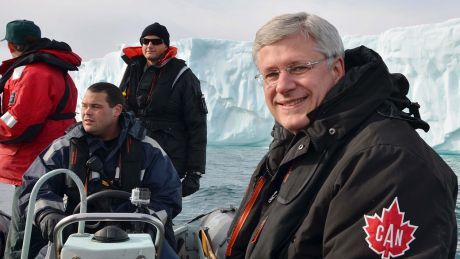Columns
You are here
Franklin my dear, I don’t give a damn

September 29, 2014
"For more than a century this has been a great Canadian story.… It's been the subject of scientists and historians and writers and singers. And so I think we have a really important day in mapping together the history of our country," crowed Stephen Harper.
Harper could hardly contain his glee at the “discovery” of the remains of the Franklin expedition, lost in 1845/6. He ascribed the discovery to scientists and modern equipment. Too bad he didn’t give credit to reports of local Inuit that led to the discovery. As early as 1847 Inuit hunters reported the fate and location of the Franklin ships to John Rae, the Scottish explorer charged with finding the expedition. In all likelihood it will also turn out that another part of Inuit lore will be confirmed, that Franklin’s men died out from starvation and cannibalism, and from refusing the assistance of Indigenous people.
So this great Canadian mystery wasn’t much of a mystery, and not at all “Canadian”. It is an interesting historical find, shedding light on the history of British imperial zeal. So why the personal intervention of Stephen Harper?
The scramble for empire in the Arctic
The search for a Northwest Passage shipping route from the Atlantic to the Pacific was no dispassionate scientific venture. It was part of a scramble to claim, colonize and economically exploit new territories. And at the heart of that scramble was competition with other imperial interests, including Tsarist Russia.
Today there is a new scramble for empire in the Arctic. Thanks to global warming, the impassible sea ice that doomed Franklin is fast disappearing. Resources long out of reach, under frozen tundra and under Arctic sea ice, will become accessible. That most are the same resources–fossil fuels–that created catastrophic climate change in the first place is an irony that does not cause Stephen Harper to lose sleep.
Canada is not alone in extending its reach in the Arctic, nor are the Tories the only government to rattle the sabre in the north. Who can forget how Canada and Denmark almost went to war over Hans Island in 2005, under the Chretien government. The tiny barren rock halfway between Greenland and Ellesmere Island was claimed by both nations. The Danish Foreign Minister raised the Danish flag on the island. The Liberals responded by sending two warships to visit the island. Bloodshed was narrowly averted, possibly because the press in both countries treated it as a joke and negotiations continued until 2012, with no real agreement.
The cold-war style maneuvering between Canada and Russia is less comical. On September 19, front pages reported that Canadian warplanes had confronted Russian counterparts in Canadian airspace. This was an exaggeration, if not an outright lie, but one that suited the purposes of Stephen Harper, posing as NATO tough guy against Russian involvement in Ukraine’s civil war.
International law dictates how far any nation’s airspace and maritime boundaries extend. Canada is trying to assert claim to areas of the Arctic that lie outside those boundaries. In the air they call it the “Air Defence Identification Zone”, but fancy title or not, it is international air space and Russian planes routinely fly there.
But because it serves Harper’s goals of militarism and sub-imperial ambition, the non-story was plastered across the news.
Similarly, Harper wants to turn the story about the Franklin expedition into an adventure yarn that at once glorifies the “adventurers” of the old British Empire and the intrepid discoverers and scientists of the public/private partnership that will examine the Franklin wrecks.
Harper is not alone trying to put a gloss on the murderous history of the British Empire and of the Canadian state. He is (in)famous for stating at the 2009 G8 summit that “Canada has no history of colonialism.” First Nations people, who faced cultural and actual genocidal policies from both Britain and then Canada, beg to differ.
Only two years ago, it was revealed that as the British Empire disintegrated and nations won their independence, the records of brutality and murderous colonial rule were destroyed in massive bonfires around the world. According to a Guardian article:
“Detailed instructions were issued over methods of destruction, in order to erase all evidence of the purge. When documents were burned, ‘the waste should be reduced to ash and the ashes broken up’, while any that were being dumped at sea must be ‘packed in weighted crates and dumped in very deep and current-free water at maximum practicable distance from the coast.’”
Hardly the actions of an empire supposed to spreading the virtues of “civilization” throughout the world.
As for Franklin’s doomed expedition, nothing better illustrates the arrogance of imperialism. The Inuit could have told them their survival was impossible without the aid and guidance of the Indigenous population. But no….Due to their Arctic isolation, the Inuit fared better from their brush with the British Empire than did other peoples. Now that the Canadian state and its corporate partners are set to invade, the dangers are far worse.
On his most recent trip to Nunavut, Harper reiterated his position that there is no need for an inquiry into the fate of murdered and missing aboriginal women and girls: "We should not view this as a sociological phenomenon. We should view it as crime." Meanwhile the government still refuses to make public thousands of documents related to the Residential Schools. Perhaps they should take a cue from the old British Empire, and reduce them to ash or send them to the ocean’s depths.
Corporate exploitation, environmental disasters and cold war tensions: these are the gifts Harper brings to the Arctic.
Section:










